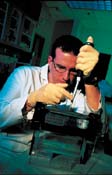 It's
in the Blood Further research added weight to his hypothesis; key signal transduction abnormalities have been discovered in the B cells of mice with lupus. Here again cd-22, a protein that causes cells to die, may play a role. "If you don't have enough cd-22, you have an overactive immune system and are prone to autoimmune disorders in which the body reacts to its own tissue." Tuscano and other investigators at UC Davis hope to begin trials with Rituxan to treat rheu- matoid arthritis within one year. His clinical specialties all stem from a desire to find better cancer treatments. After all, that's why Tuscano went into research in the first place. "There's such an enormous need for new treatments," Tuscano observes. "We need more effective and less toxic therapies to be developed. Cancer is such a devastating disease, and the majority of malignancies are not well-treated." Tuscano hopes to gird the arsenal of anti-cancer drugs with his work. And so the battle continues.
Home |
Table of Contents |
To our Readers |
Building on Basics UC Davis Health System | © 2000, 2001, 2002 UC Regents. All rights reserved. |
Post-graduate researcher Hayes McKnight loads protein samples into gel for analysis. |

